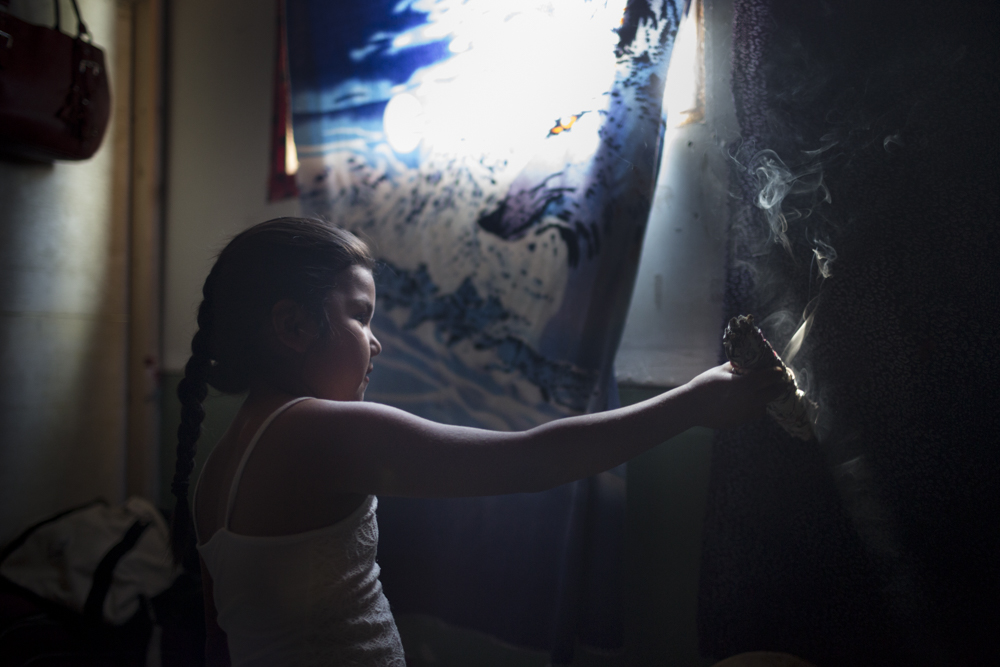Peetabeck by Nick Kozak
Fort Albany (population of approximately 900), traditionally known as Peetabeck, is a remote Indigenous First Nation community, one of over 600 in Canada. It is located on the western coast of James Bay in Northern Ontario. Fort Albany is a Cree community and home to survivors of the notorious St. Anne's Residential School, which closed in 1964. The community is accessible only by air, water, and winter road.
I first became interested in Fort Albany when my partner Amanda travelled there to work as a Summer Literacy Camp Councilor in 2015. In November of that year I made my first trip to Fort Albany as a volunteer with ArtsCan Circle. By February 2016 I had travelled back via the winter roads with writer and former Journalist for Human Rights in Fort Albany, Jack Locke. Last summer I returned for almost two months to document the lives of young Albanians.
Like many First Nations reserves in Canada, Fort Albany is on simultaneous paths of recovery, re-discovery, and preservation. As key community members, including Elders, have begun to further explore and promote their traditional roots through ceremonies, hunting practices, language, cuisine, music and art, it has become imperative for them to share these practices with their youth. While dealing with the effects from past atrocities, Peetabeck is practicing a delicate, and sometimes divided, dance between the reclamation, acceptance, and rejection of both traditional and Western cultures.
It is the young people, at times neglected, sometimes bored, or even abused, who face the most devastating challenges of a community severely affected by drugs, alcohol and what many refer to as the "suicide spirit". It seems, in my experience, that everyone in Fort Albany has a tragic story to share, whether it be a mother, a father, a son, a daughter, or an uncle or aunt. So many lives have been cut short. The trauma is intergenerational and is rooted in the long, dark history of travesties committed against First Nations in Canada, which include but are not limited to rape and physical abuse, endured by many of those who attended residential school.
How does a community overcome the pain? Continuous efforts are made to involve people, especially the youth, in positive activities and reconnect them to the land and traditions that were destroyed by residential schools and other deplorable colonial activities of Canada's past.
Nick Kozak lives and works in Toronto, Ontario, Canada.
To view more of Nick's work, please visit his website.
Youth Council Awareness Walk
Children lead an Awareness Walk against drug dealing and bootlegging on Fourth Street in Fort Albany.
Xavier and Miranda lay in bed
Youth Initiative Xavier Inishinapay lays in bed, clutching a stuffed toy, next to his best friend and Youth Council member Miranda Chookomolin, during a visit to her house one morning.
Girl looking up at the sky
A young participant lays on the grass outside of Peetabeck Academy following the Fort Albany Awareness Walk.
Michael Loone
Son of Mike Loone now in college on the door to a shed belonging to Thomas Scott.
Naomi's 2nd birthday
Mike Koostachin holds the cake while his wife Charlotte Nakoochee lights the candles during a birthday party for two-year-old Naomi who was adopted by the pair. Naomi's mother Kayla Nakoochee passed away in March by suicide.
Kathleene smudges
Six-year-old Kathleen Metatawabin smudges with sage inside her aunt Jennifer's room in Fort Albany First Nation.
Michael Inishinapay
Michael Inishinapay, 13, sits on a couch in the library at Peetabeck Academy.
Scars on an arm
Scars on the arm of a young man in Fort Albany who has struggled with issues such as self-harm.
Children's bike
A children's bike lays in the water at the bottom of the causeway in Fort Albany.
Young people
Young people at the banks of the Albany River during the first Fort Albany Sundance.
Nicole
Nicole Sutherland gathers cedar near the dikes of Fort Albany for her first sweat lodge that she and her long-time friend Joseph Scott built in her backyard.
New growth
A seedling in the cedar floor of a sweat lodge days after a sweat near the Sundance Grounds up at the dikes of Fort Albany First Nation.
Game of Particles
A game called Particles is played during the Fort Albany Youth Gathering.
The grave
The grave of a young man who took his own life in early 2016 at the Fort Albany cemetery.
Hands up towards the Creator
During a Sundance preparation meeting days before the start of the first Fort Albany Sundance. The arms are held up towards the creator asking to be lifted up like a child reaches up to its parents.
Canada Day celebrations
Children look up and cheer at a Canada Day fireworks show put on behind Peetabeck Academy.
Sunset on the causeway
A man walks along the causeway as the sun sets in Fort Albany.
Fireworks in the sky
Canada Day fireworks put on by Fort Albany First Nation above the field next to Peetabeck Academy.


















